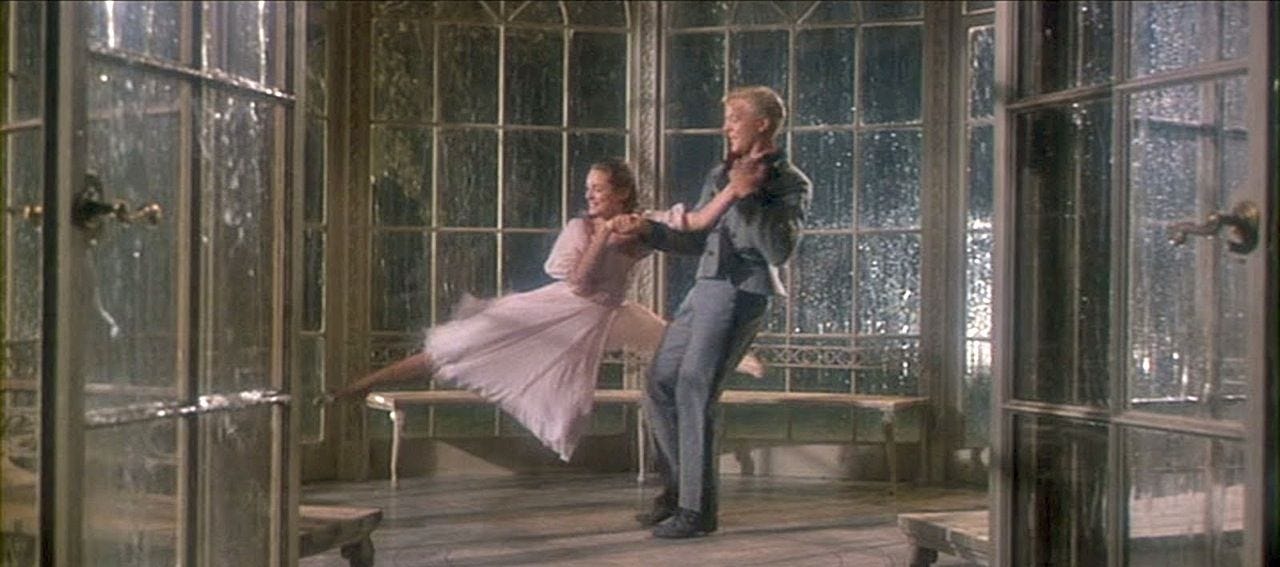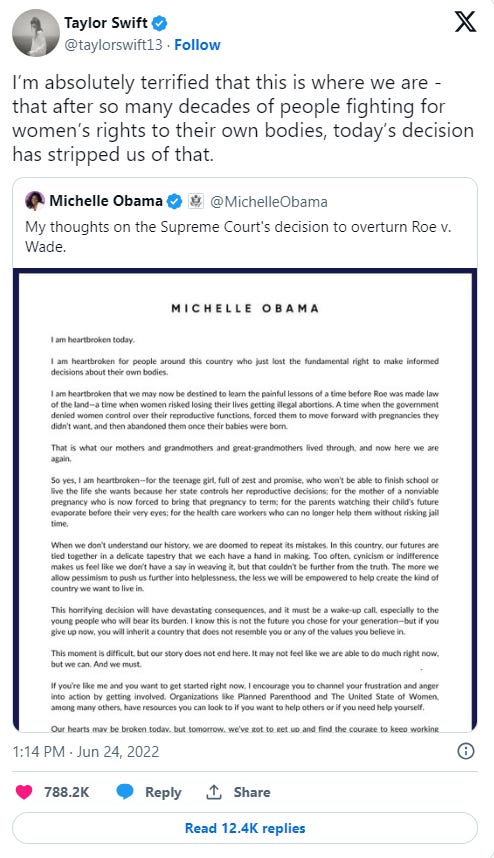If you made the mistake of taking the anti-abortion movement at its word, then this week’s ruling from the Supreme Court of Alabama ending most forms of in vitro fertilization likely comes as a shock. Why, after all, would a movement nominally dedicated to life and babies want to ban a technology that helps more people have babies? The inability to easily square that circle is likely why the famed propagandist Kellyanne Conway reportedly told Republicans to back off the issue back in December, showing them polling that the legality of IVF has overwhelming public support even among their own base with 78% of “pro-life advocates” and 83 percent of Evangelical Christians supporting the right to the procedure.
This cognitive dissonance is also likely why Republican responses to the ruling have been so scattered. Nikki Haley, who had been attempting to carve out a moderate lane on abortion, nonetheless endorsed the logic of ruling against IVF while Alabama Senator Tommy Tuberville—who waged a year-long, one-man campaign against abortion protections for members of the armed forces—responded to a reporter question about the ruling like a malfunctioning ChatGPT.

 Tiktok failed to load.
Tiktok failed to load.Enable 3rd party cookies or use another browser
Even if you recognize the attacks on abortion access have long been about the exploitation of reproductive labor, fueled by racist demographic anxieties and coercive pro-natalist politics, limiting access to IVF seems like a perverse action by this same movement. With more people waiting longer to get married or have children—supposedly fueling a “population collapse” Elon Musk once called “a bigger risk to civilization than global warming”—wouldn’t this lead to funding IVF rather than abolishing it? Isn’t this prevention of procreation for the largely white, largely wealthy women who access IVF in direct opposition to the rest of their eugenic regime?
The answer to these questions is, in fact, remarkably obvious. It packs stadiums around the globe, graces red carpets and magazine racks, and breaks records as surely as it breaks hearts. The answer has become so culturally ubiquitous as to be inescapable, so culturally dominant it steals the spotlight on the world’s largest stage. The answer to the right-wing legal movement’s opposition to IVF, as it is to so many things, is Taylor Swift.
Much has been made of Swift’s Beatlemania-style popularity over the last year, and any cultural artifact so omnipresent is a perfect prompt for lazy opinion writers and conspiracy theorists alike. In the last few months especially, right-wing media figures focused on her relationship with football player Travis Kelce as a reported “psyop” perhaps previewing an expected endorsement of Joe Biden. Swift has, after all, put forward an explicitly liberal politics in the last few years, attacking Trump for “stoking the fires of white supremacy” during the heated summer of 2020 and condemning the Supreme Court’s opinion in Dobbs overturning Roe v. Wade.
Conservative opposition to Swift is more than just partisan politics, however. It’s even more than (though certainly includes) “manosphere” opposition to all things feminine, what Ryan Broderick at Garbage Day calls “cultural encoding” aimed at “labeling everything that threatens them as feminine and, thus, bad.”
Though she has never publicly discussed any feelings about motherhood nor her own access to contraception, abortion, or other reproductive technologies, Swift nonetheless offers a vision of womanhood that is resistant to the kinds of domestic servitude both the conservative legal movement and online reactionaries want for all women like her and her fans. This has only grown more obvious as she ages out of her adolescent rise to stardom and matures both musically and literally, her songs increasingly a work of autofiction about a life outside of marriage and the nuclear family. Taylor Swift embodies one of the most frequent nightmares of patriarchal ideologies—a thriving, unmarried, childfree woman in her thirties.
When Swift first rose to popularity, she was an icon of white, pastoral femininity—a blonde-haired, blue-eyed country starlet with dreams of a Prince Charming arriving on a white horse. “Love Story,” easily the most timeless track off her breakthrough album Fearless, is a cheerful ode to young love ending in what conservatives yearn for—”I talked to your dad/go pick out a white dress”—a virginal proposal of marriage ordained by a patriarch.
Young love holds a particularly strong place in the conservative Christian imagination—one that the availability of IVF helps women betray. In a recent writeup for the Heritage Foundation, anti-feminist activist Emma Waters encourages Protestant denominations to support the prohibition of IVF “as a violation of the ‘package deal’ of marriage, sex, and procreation.” Because IVF helps women delay motherhood while not quite sacrificing it, Waters writes, churches must encourage young women to not only be fruitful and multiply but do so as early as possible.
While recognizing that some situations are indeed outside of a couple’s control, Churches would do well to actively encourage their congregants to go on dates, pursue marriage, and have children sooner rather than later. One non-denominational Church in Washington, DC where many of our friends attend boasts a high percentage of single men and women in their 20’s and 30’s.
In their condemnation of IVF, the US Conference of Catholic Bishops says the procedure “eliminates the marriage act”—or, as it’s also known, fucking—“as the means of achieving pregnancy, instead of helping it achieve this natural end.” Combined with the prohibition of premarital sex, the goal is channeling sex drives into (heterosexual) marriage as soon as possible to produce the most (white) children possible while the person carrying those babies is still biologically able to do so.
The motherhood mandate is not simply about reaching motherhood but doing so early and often. The earlier a woman can be convinced or coerced to have children, the more children she can produce before she becomes naturally infertile. Given what we know about the social and economic impacts of early motherhood, this renders women more vulnerable over a longer period of their life, subjecting them to more surveillance, providing more free labor, and being more dependent upon a male breadwinner for longer. What, for an increasingly-fascist movement, is not to like?
Reactionary podcaster Matt Walsh gave voice to this in resurfaced recordings of his thoughts on teen pregnancy and marriage. Speaking back in 2011, Walsh said:
Girls between the ages of 17 and 24 is when they're technically most fertile. OK? That's biological. That's a fact. I am just stating facts. That's all I'm doing. But what happened recently, and this is the fourth fact, recently in the last 30 years or so, we decided that that's way too young to start a family…So what I’m saying is that the problem is not, per se, teenage pregnancy — it’s unwed pregnancy.
A year after Walsh made these comments (comments he and his employer have since declined to walk back), Taylor Swift released Red. For many Swifties, the Red era is a distinct turning away from childish things, a farewell to the girlhood preening for marriage of Fearless and Speak Now, and an embrace of both a more mature sound and more mature themes. “All Too Well” is easily the album’s centerpiece, since expanded into a 10-minute epic of rage and heartbreak aimed squarely at betrayal from an older man. Like so much of Swift’s work, Red is about granting oneself the grace and the subjectivity denied by others, a work of agency aimed at recapturing her experiences as surely as she’s since worked to recapture her master recordings.
It was also around this time white supremacists fought to claim Swift as their own. Pinterest posts attributing quotes from Adolf Hitler to the singer went viral, prompting a cease-and-desist response from an attorney representing Swift. By 2015, fascists across multiple continents were hailing her as “an Aryan goddess,” remarking how resilient her commitment to white supremacy must be given “she's surrounded by these filthy, perverted Jews, and yet she remains capable of exuding 1950s purity, femininity, and innocence.”
This is, of course, a deranged and hateful misreading of her work, one that mistakes Swift’s allure to young women as an oppressive, submissive project rather than a liberatory one. At the same time these bigots were discovering her supposed utility for their own goals, Swift was taking adamant strides away from that “purity, femininity, and innocence” in her music. 1989, after all, marked her final departure from her country music origins and towards a glitzy, optimistic, and notably marriage-free portrayal of adult womanhood. It was at this same time she seemed to dial down public musings about her relationships with men (Harry Styles notwithstanding) and instead curated her “squad,” a coterie of young women like her making frequent appearances across New York City.
Even 2017’s Reputation finds Swift romantically entranced (ostensibly with British actor Joe Alwyn) but also deeply rageful, openly lustful and out for blood. As time marches on, she drifts further and further from the matrimonial ideal, opening and closing “eras” like rooms of a home she’s making for herself.
Her (albeit tepid) advocacy for progressive causes and LGBTQ rights has since dissuaded any claim the right had to her as bunk conspiracies—but something more holistic about Swift herself has burned whatever bridge the right thought they were crossing.
When Taylor Swift was 30, she released folklore and evermore, arguably her most mature works thematically and musically. They are folk-pop masterpieces, adventurous and experimental even as they soothe and calm. To release two inventive albums expanding her repertoire of modes and voices at the end of her 20s—the very period conservative Christians feel a young woman should be tying herself to a man and taking advantage of her virile fertility—is quite defiant, a declaration that you have far more stories to tell and personal growth to pursue even as those around you take the more traditional paths. “Cold was the steel of my axe to grind for the boys who broke my heart,” she sings of the Johns and Jakes from her earlier albums. “Now I send their babies presents.”
Importantly, however, that ambition doesn’t come at the expense of her dreams of love and motherhood. “Our coming of age has come and gone,” Swift coos on the sparse ballad “peace”, a song that functions almost as an apology for failing to reach the domestic ideal, a wish that every family was a chosen family:
And you know that I'd swing with you for the fences
Sit with you in the trenches
Give you my wild, give you a child
Give you the silence that only comes when two people understand each other
Family that I chose, now that I see your brother as my brother
Is it enough?
As Swift grows older, she doesn’t abandon matrimonial aspirations because she doesn’t have to. She enters her thirties on a wave of artistic ambition and a growing cast of past lives, a multitudinous that apologizes for nothing and acknowledges the power of reinvention in the face of a world that only has one role for you to play. But the appeal of motherhood and monogamous love are not sacrificed at the altar of those pursuits—they are options still available to her and should be available to all the women writing their own stories.
In between the 2020 releases of folklore and evermore, Supreme Court Justice Ruth Bader Ginsburg's passing paved the way for the nomination of now-Supreme Court Justice Amy Coney Barrett, a mother of seven with deep ties to the Christian nationalist legal movement. As came out during her confirmation process—and recently resurfaced following the Alabama Supreme Court’s ruling against IVF—Barrett added her signature to a 2006 newspaper ad placed by an anti-abortion group, saying she and the other signatories would “defend the right to life from fertilization to natural death.” When pressed on the matter, Barrett declined to rule out criminalizing IVF on this basis.
After just two years on the bench, Barrett would join the other conservative justices on the Court and overturn Roe v. Wade and the federal right to abortion in an opinion that became the basis for this week’s ruling in Alabama. As many have since noted about the Dobbs opinion, a hyperfocus on the life of the fetus seems to come at the expense of any concern for the person carrying it. Justice Samuel Alito instead cited concerns about the “domestic supply of infants” available for adoption and the fragile gains of women’s rights advocates for legal protections like paid leave and protections from pregnancy discrimination. All of this made the sacrifice of people forced to carry pregnancies justifiable in the eyes of the Court largely because, as Alito noted of the Mississippi abortion bans gestational limits, “at twelve weeks the ‘unborn human being’ has ‘taken on the human form in all relevant respects.’”
“I, too, have taken on the human form in all relevant respects,” said The Cut’s Irin Carmon in response to the leaked version of the opinion, “although I couldn’t find mention of it in Alito’s draft opinion.” As Carmon notes, pregnancy is an enormously disruptive and dangerous venture—even for healthy, well-resourced women—and an outright life-threatening prospect for millions of poor and Black women in the US facing the highest maternal mortality rate in the developed world. Nonetheless, Justice Barrett herself seemed to wave off concerns about these risks during the arguments, gesturing at safe haven laws and talking about childbirth as if it were a haircut.
For millions of young women, their adoration of Taylor Swift as a person and as a songwriter comes, in part, as opposition to this routine denial of both their embodiment and their subjectivity—a denial that comes from both the people in their personal lives and the state power and systems attempting to extract the most value from their bodies. Swift takes seriously the pains, needs, and desires consistently devalued across their lives and too often subsumed to the matrimonial mandate Swift resists. But simultaneously, she knows that wanting to love and be loved are not desires for subservience. Motherhood and true love are pursuits only made all the more worthwhile when they are the result of one’s personal agency rather than the denial of it, and reproductive technologies—be it birth control, abortion, or IVF—help preserve that core principle by keeping as many doors open as possible as long as possible.
No one is entirely sure if “Bigger Than The Whole Sky,” a mournful ballad available on the “3AM Edition” of her 2022 album Midnights, is about a miscarriage. That is, nonetheless, the meaning many Swift fans have taken from the track, citing its ode to someone lost before they were ever known:
And I've got a lot to pine about
I've got a lot to live without
I'm never gonna meet
What could've been, would've been
What should've been you
Even before the Supreme Court overturned Roe v. Wade, miscarriages could be a fraught business for many mothers. Despite the fact they are they far more common than most suspect, women are frequently blamed for them and encouraged to blame themselves—including by criminal courts who charge women with manslaughter for supposedly failing to prevent the pregnancy’s termination, with the organization Pregnancy Justice finding at least 1,800 such cases between the Supreme Court’s opinions in Roe and Dobbs. Brittany Watts, an Ohio woman who miscarried at home (where most miscarriages occur) was initially charged with abuse of a corpse late last year though, following a national outcry, charges were eventually dropped.
Conservative Christian activists often square these instances by echoing centuries of pseudoscience and medical paternalism blaming mothers for their fertility struggles. In fact, for the Heritage Foundation activist I cited earlier, infertility is simply another excuse to attack reproductive health technologies:
The long-term use of hormonal contraceptives and IUDs can often contribute to a woman’s difficulty getting pregnant once she stops using them. These factors, in turn, drive the demand for IVF or other invasive fertility treatments. When we delay, by our own volition or out of necessity, the normal patterns of nature, many unexpectedly find that conceiving a child later in life is much more complicated than they previously thought.
That hormonal contraceptives and IUDs do not, in fact, pose a threat to fertility once stopped even when used well into a patient’s thirties, is rather irrelevant. The crux of Heritage’s propaganda on this issue—and similar agitprop promoted by all nature of tradwives, wellness influencers, and “conspirituality” types—is that phrase “normal patterns of nature.”
In short, a woman who, like presumed the narrator of “Bigger Than The Whole Sky,” wants a child but loses a pregnancy has only herself to blame. She should’ve started sooner, should’ve settled down earlier, should’ve sacrificed her other ambitions and dreams to this mandate.
Despite their efforts this week, the mainstream of the Republican Party has already signed up for this ideology. They have already appointed the judges, sponsored the bills, and endorsed the logic that would withhold the dream of parenthood from millions who benefit from these technologies and blame women for failing to reach motherhood without them. Indeed, the same need to force women into submission to an ideology that rejects the very notion they have value outside their biology is one reason why fertility assistance has been kept out of reach along racial and class lines for far longer, fueled by racist anxieties about white fertility. The opposition to IVF is simply an extension of their efforts to entrench and strengthen a white supremacist project through the suppression of self-determination and the denial of women’s wants or needs.
When right-wing figures like Elon Musk or Christian nationalists like Heritage cite dropping birth rates—specifically among white Western women—it’s usually parallel to opposition to “gender ideology,” an amorphous term weaponized by strongmen the world over to decry feminism, queer advocacy, reproductive rights, or any other world view that suggests people’s own agency should come above the mandate to create more of the “right” children at all costs. In previous iterations, these fears were focused on “degeneracy” or “race suicide” and the efforts to thwart these dangers to racial supremacy focused as much on forcing white women to give birth as sterilizing Black, immigrant, and disabled women.
For that project to extract the most value from white women like Taylor Swift, they must be coerced into that “package deal” the Heritage Foundation cited—sex as strictly and exclusively the consummation of a heterosexual marriage performed to create as many babies as possible. It is not only if she becomes a mother they hope to mandate, but when and how. Taylor Swift represents, to them, a dangerous cultural force challenging that reproductive regime—she is an icon of the “gender ideology” they abhor because, much like herself and her music, that “ideology” is simply a celebration of the life and lives made possible when we are granted control over our own bodies and our own stories.





Was it better in the original German?
Kinder, Küche, Kirche
(Children, kitchen, church)
This is super interesting. I feel that in years past the average person on the left would just look at some of the stances on the right and be frustrated, confused, or even just smug towards the seemingly illogic/incongruence of it all. The classic voting against your own interests type of sentiment. But now I think people are coming around to see it as not necessarily illogical, but just very sinister logic.